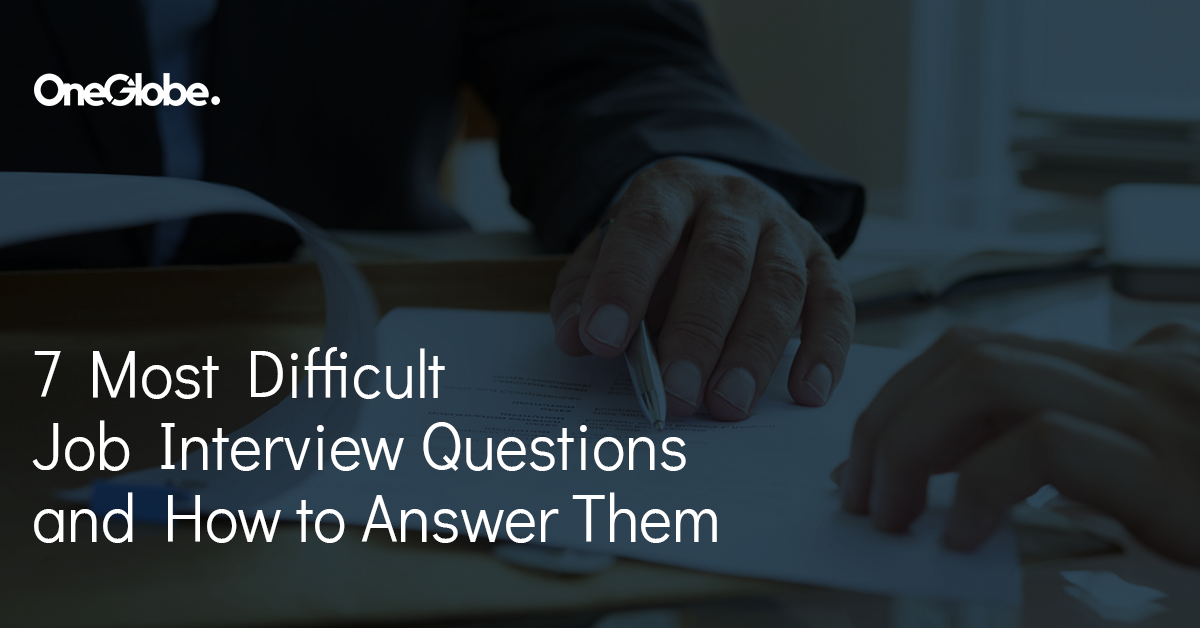
You can never be prepared enough for a job interview – even then, things might not go your way despite your best efforts. Some of the most difficult job interview questions are only considered as such because job candidates find them uncomfortable to answer. They often relate to the candidates’ moments of weakness and ask them to open up to interviewers whom they’ve just now met for the first time.
Jobs OneGlobe will enable you to apply for amazing job opportunities around the globe but it’s up to you to cross the proverbial finish line and talk to the employer or recruiter yourself. According to published data, up to 85% of job applicants are found to be lying on their CVs, with 76% being rejected due to unprofessional correspondence or attitude during the selection process. Remember – the employer will vet you just as much as you’re vetting them.
Instead of flunking your job interview and losing a great professional opportunity, you can prepare for some of those difficult job interview questions well in advance. Let’s talk about job interviews and how you can answer some of the questions the interviewer will undoubtedly bring up during your in-person or video interview.
Preparing for the Most Difficult Job Interview Questions
Before you start working on your difficult job interview questions preparation, there are several other things you can do to prepare. Every company you apply for will inherently have different expectations from the people they want to hire.
As such, you should go out of your way to research the company you’ve submitted the job application to. Find out as much as you can about their business portfolio, history, and how they treat their employees. This will give you a better idea of what kind of an offer to expect in terms of being hired.
You’ll showcase how professional you are by knowing a little bit about the company before the interview. This will make tackling difficult job interview questions more manageable. Here’s what else you can do to prepare:
- Review the job listing carefully before the interview
- Do a mock interview with a friend or someone you trust
- Plan what you’ll wear to the interview well in advance
- Clean up your surrounding in case of video interviews
- Check your internet connection and web camera
- Don’t be late for your interview – it sets a bad precedent
Let’s take a look at the most difficult job interview questions you might come across while looking for work. Keep them in mind and try to prepare good answers to each one to increase your odds of getting hired more easily.
Write Your New CV!
1. What Do you Dislike Doing and Why?
Be prepared to answer a lot of questions you might not be too comfortable with professionally. Very few if any interviewers will ever ask you about your private life or plans – so there’s that. But, you’ll have to know how to respond to difficult job interview questions without snark, passive aggressiveness, or mockery toward the interviewer.
A good first example is a question of what you dislike doing and why professionally. For example, if you’re a graphic designer, you may not like designing posters – explain why. Think about this answer in your spare time and try to make it as objective and informative as possible to the interviewer to justify your dislike of something.
2. What’s Your Biggest Professional Failure?
Have you ever caused an entire shipment to go bad because you filed the wrong transport paperwork? Have you caused your previous company to lose time and resources on reprinting and resending billboards to an out-of-town location because you calibrated the printer poorly?
Think about what you’re not proud of doing and what you’ve learned from it. The way you describe your experience and what you took away from it will speak volumes of your character and reliability as a professional – no one will hold it against you.

3. Why Should We Hire You Instead of Someone Else?
What makes you unique as a job applicant? Is it your personality, your insight, or your years of experience in the industry? You need to learn how to sell yourself to a potential employer without sounding desperate for employment. This is undoubtedly one of the more complex and difficult job interview questions to ponder.
When an interviewer asks you why they should hire you, be prepared with a good answer. No one wants to hire someone unsure of what they can or can’t do. Don’t lose hope and think about this question by listing a few traits, skills, and insights into who you are as an individual and professional worth hiring.
“What’s the point of being alive if you don’t at least try to do something remarkable?” — John Green
4. Why Did You Quit Your Previous Job?
If you’ve just left a job or have been unemployed for a certain period, you’ll need to come up with a good answer for it. Whether you’ve had to quit your job for familial reasons or to try and start your own business – that’s okay.
Don’t avoid answering this question however as it’ll be seen in bad faith. The employer might wonder how long it’ll take for you to leave their company just as you’ve left the previous one, for example. While this is one of the more tricky and difficult job interview questions, it’s only polite to answer openly.
5. How Do You Handle Stressful Situations?
Whether you’re applying for a job in an industry you’re familiar with or changing careers, buckling under pressure isn’t something you want to do. The way you handle difficult job interview questions will speak volumes about you as a professional. The interviewer might ask you some difficult job interview questions, such as about your conduct under pressure and whether you’re able to multitask or quickly think on your feet.
It’s best to be open and honest about difficult job interview questions such as these because the employer will easily determine whether you’ve been truthful or not. If you aren’t good at dealing with stress, that’s okay – be upfront about it and no one will hold it against you.
6. What If You Had to Work Overtime or During Weekends/Holidays?
Depending on the industry you apply for work in, you may be required to work during holidays or weekends under certain conditions. For example, working in hospitality almost certainly means that you’ll have to work during some holiday seasons or weekends to cover your coworkers’ shifts. Are you okay with that?
Even if you’re not, you need to explain your motives very carefully and professionally to the interviewer. If the compensation is fair and you’ll gain certain perks such as extra free days in off-seasons, why not consider saying yes?
Alternatively, you could negotiate for a lower salary if you’re unwilling or unable to work during holidays or weekends due to familial, health, or other reasons. The most difficult job interview questions are the ones that’ll require you to think on your feet – don’t go into the interview blind and think on it a bit in advance.
7. What Salary Do You Expect to Earn?
Discussing your salary expectations with the interviewer is one of the most difficult job interview questions you’ll face. After all, you’re applying for a job with a steady income and full-time employment benefits – you don’t want to be mistreated. Likewise, you don’t want to be unfair toward the employer and ask for too high of a salary compared to the industry norm.
Take everything you’ve previously talked about into consideration and set a net and/or gross salary you’d like to receive. Be open to negotiating a bit – you might be able to start with a lower salary and bump it up after a few months depending on your performance. Don’t be shy to say how much you consider fair compensation – many employers will go out of their way to meet you halfway.
“The way to get started is to quit talking and begin doing.” — Walt Disney
Finding your Next Professional Opportunity with Jobs OneGlobe
Answering these and similar difficult job interview questions is a matter of preparation. Different employers and recruiters will have different sets of questions and different expectations from every candidate they interview.
In other words – be prepared for curveball questions that you might not expect to hear. Some interviewers might ask you whether you plan on having children soon or whether you’d leave their job for a better position elsewhere.
Being diplomatic, objective, and professional during job interviews is crucial for your successful employment. Start your journey toward new job opportunities by creating a brand-new CV using the Jobs OneGlobe professional CV builder. As you apply for jobs, research the companies you’ve sent your application to before the interview and show up on time – the right employer will like what you’re telling them and hire you outright.




Share
Facebook
Twitter
LinkedIn
Telegram
Tumblr
WhatsApp
VK
Mail